Two Years Later, Joe Biden Has Failed to Shake the Taliban’s Iron Grip on Afghanistan
Two years after the fall of Kabul, the Taliban retains an iron grip on power in Afghanistan. Promises by the international community to hold the new government to higher human rights standards than the regime dislodged by the U.S. invasion in 2001 have come to nothing.
The Biden administration promised to weaken the “Islamic Emirate of Afghanistan” after bringing it to power with the disastrously bungled 2021 troop withdrawal, but the regime appears as strong as ever.
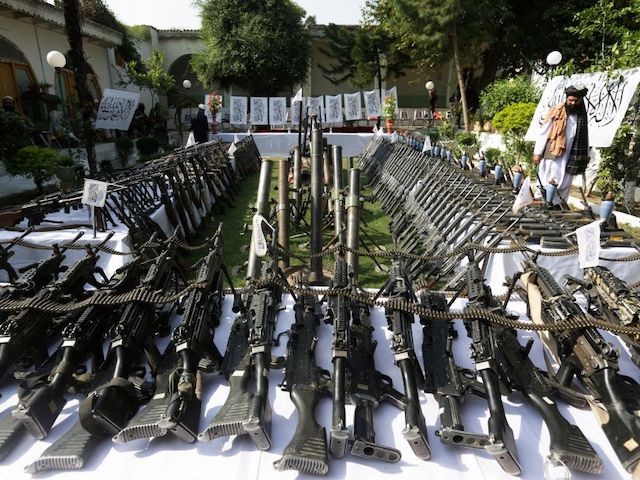
Taliban fighters stand guard next to the weapons on display for media representatives after an operation in which weapons and ammunition were seized from various locations in Asadabad of Kunar Province on September 25, 2022. (AFP via Getty Images)
The Associated Press on Monday delivered a grim status report on Afghanistan two years later — grim because the status of the Taliban, ostensibly one of the most isolated regimes in the world, is not half bad:
The Taliban face no significant opposition that could topple them. They have avoided internal divisions by falling in line behind their ideologically unbending leader. They have kept a struggling economy afloat, in part by holding investment talks with capital-rich regional countries, even as the international community withholds formal recognition. They have improved domestic security through crackdowns on armed groups such as the Islamic State, and say they are fighting corruption and opium production.
But it’s their slew of bans on Afghan girls and women that dominated the Taliban’s second year in charge. They barred them from parks, gyms, universities, and jobs at nongovernmental groups and the United Nations – all in the space of a few months – allegedly because they weren’t wearing proper hijab — the Islamic head covering — or violated gender segregation rules. These orders followed a previous ban, issued in the first year of Taliban rule, on girls going to school beyond sixth grade.
The Taliban’s abuse of women is especially grating because the United Nations was optimistic at first, spotlighting every hopeful signal from “Taliban 2.0” and insisting the regime would not be foolish enough to invoke the wrath of the civilized world by returning to its brutal policies of the 1990s.
There is little optimism to be found at the U.N. these days. In March, a panel of experts convened by the U.N. High Commissioner on Human Rights said the Taliban had “erased” 20 years of progress on women’s rights in just two years.
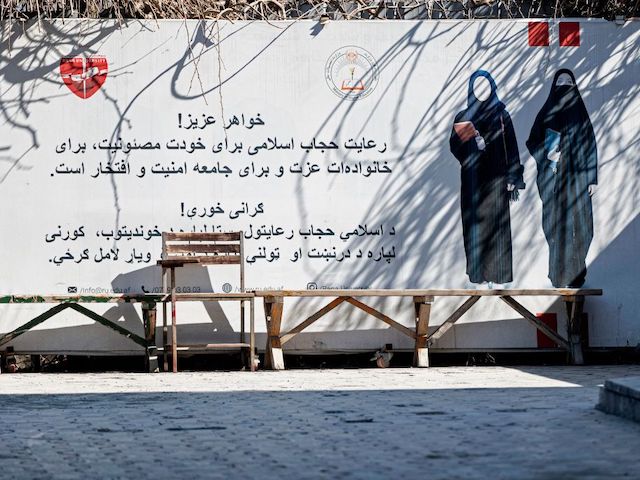
A banner ordering women to cover themselves with a hijab is pictured at a private university after the universities were reopened in Kabul on March 6, 2023. The image shows a faceless woman in a hijab and a woman with a face covered by a niqab. (WAKIL KOHSAR/AFP via Getty Images)
The U.N. said:
All over the country, women report feeling invisible, isolated, suffocated, living in prison-like conditions. Many are unable to have their basic needs met without access to employment or aid, including access to medical healthcare and psychological support in particular for victims of violence, including sexual violence. It’s a sobering reminder of how swiftly and aggressively women’s and girls’ rights can be taken away.
The U.N. Human Rights Commission was short on ideas for what to do about it. Its statement included “calls” for the Taliban to remember the “commitments” it made to the U.N. after seizing power in 2021, but the regime obviously cares nothing for those promises, and neither the U.N. nor the Biden administration has any leverage over Kabul.
On the contrary, the Taliban has easily been able to take the population of Afghanistan hostage and force the U.N. to make an “appalling choice”: either keep money and supplies coming, no matter what human rights atrocities the Taliban commits, or watch hundreds of thousands of Afghans die from starvation and illness.
In July, the U.S. Special Inspector General for Afghanistan (SIGAR) uncovered “horrific information” that the Taliban was stealing and blocking humanitarian aid. SIGAR John Sopko said this left Congress in the same agonizing position as the U.N., torn between “giving humanitarian assistance to Afghans who are suffering versus how much of that is going to a regime which we hate.”
American money is still rolling into Afghanistan despite these reservations. SIGAR noted that for all of the Biden administration’s talk about isolating the Taliban and forcing it to do better on human rights, the U.S. government remains the biggest donor to Afghanistan, having sent more than $2.1 billion since the fall of Kabul in August 2021. The Taliban has made no obvious concessions to the administration to keep these billions flowing in.
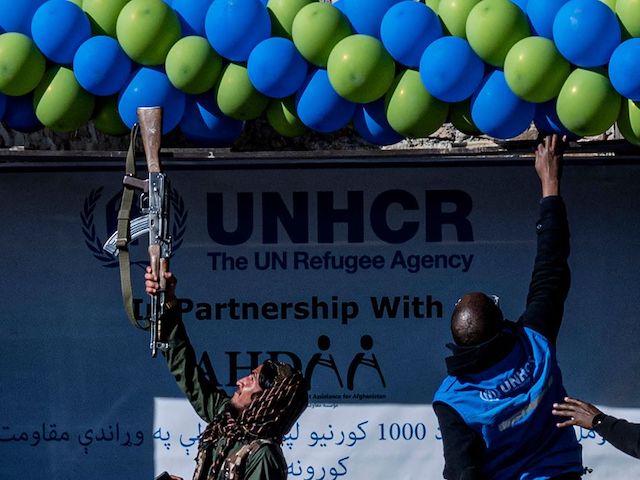
In this photo taken on December 15, 2022, a member of Taliban security adjusts balloons with his gun during a handover ceremony of newly built houses constructed by the United Nations refugee agency (UNHCR) in Barmal district, Paktika province. (WAKIL KOHSAR/AFP via Getty Images)
The Taliban regime receives far less financial assistance than the U.S.-backed government it overthrew, but most of the suffering caused by cuts to foreign aid has fallen upon the people of Afghanistan, not the rulers. Early predictions that sanctions combined with Taliban mismanagement would cause the Afghan economy to implode have not come to pass.
The Associated Press pointed out:
The World Bank said last month that the local currency, the afghani, gained value against major currencies. Customers can withdraw more money from individual deposits made before August 2021 and most civil servants are being paid. The World Bank described revenue collection as “healthy” and said most basic items remained available, although demand is low.
The “Islamic Emirate of Afghanistan” has not been officially recognized by any other power, but the Taliban has been making do without it. China and Russia are supportive of the regime, even though they have not bestowed full diplomatic recognition on it. China is especially ravenous for Afghanistan’s minerals and will pay handsomely to get them. Beijing can afford it because the forced “green energy” and electric vehicle “revolutions” in the Western world have made America and Europe utterly dependent on China for raw materials.
The New Yorker noted on Sunday that about 20 of Afghanistan’s embassies around the world are still operational, staffed with holdovers from the deposed elected government instead of the Taliban. These “Republic-era” ambassadors meet occasionally to discuss the horrors of Taliban rule, but they can do nothing to oppose it. The Taliban does not seem greatly troubled by these expensive theatrical performances of diplomatic contempt.
The Taliban is so secure in power that some of its bored fighters are wandering over the border to other nations, looking for battles to get involved with. Hundreds of them have joined insurgent groups in Pakistan.
“Peace and security have been secured in our country, so now we need to fight in other countries and secure the rights of other Muslims,” a young Taliban fighter recently explained to the New York Times.
Hopes that a serious resistance movement would rise up against the Taliban have been dashed. Ahmad Shah Massoud, son of a folk hero in Afghanistan’s resistance to Russian occupation, formed a group called the National Resistance Front (NRF) soon after the fall of Kabul, but two years later, it poses little, if any, threat to the Taliban. Massoud, who denounced the Taliban as a horror on par with ISIS and called for a comparable international coalition to defeat it, mostly gives speeches at Western think tanks these days.
Predictions that the Taliban would be torn apart by a power struggle, possibly instigated by members of the terrorist Haqqani Network embedded in the Taliban government, have not come to pass. Although, some analysts believe the Haqqanis would still like to eliminate Supreme Leader Haibatullah Akhunzada and take complete control.
As for political protests, some Afghans are still remarkably courageous in demonstrating against the regime, but Taliban fighters put these demonstrations down with ruthless efficiency. Women have been beaten with rifle butts for daring to march through Kabul and demand equal rights. The Taliban constantly threaten to arrest or kill anyone who creates “turmoil.”
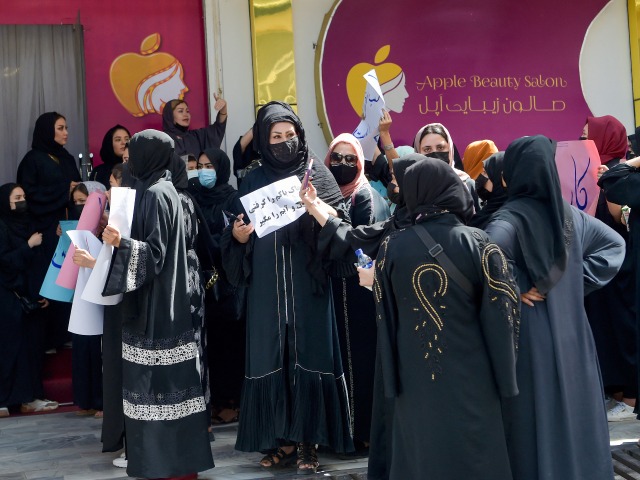
Afghan women stage a protest for their rights at a beauty salon in the Shahr-e-Naw area of Kabul on July 19, 2023. (AFP via Getty Images)
Women, desperate for jobs and education but terrified of Taliban crackdowns, have taken to “protesting” online, which mostly means keeping the names and images of demonstrators alive for overseas audiences.
“Even broadcasting our protests on social media networks, we are insulted, warned, and threatened with prison and death by the Taliban and their supporters – but we will not give up our fight to bring the crimes of the Taliban to the eyes and ears of the world,” protest organizer and former TV news anchor Maryam Marof Arwin told Reuters on Monday.
Like other authoritarian regimes, the Taliban no longer fears the Internet or sees any reason to ban it, as the previous Taliban regime did in the 90s. Instead, the Taliban uses social media to push its messages and tighten its grip on the public, and it grows increasingly adept at hunting down and punishing online demonstrators. Reuters noted that many of the women protesting online are wrapping themselves in full-body coverings, both to avoid violating Taliban dress codes and to keep their identities secret.
Al Jazeera News on Monday saw signs the Biden administration is throwing in the towel on pressing the Taliban for human rights improvements, dropping those demands to pursue improved diplomatic contacts:
On July 31, representatives of the Taliban and US officials met officially for the first time since August 2021 to discuss the way forward for their relations and steps towards the recognition of the Taliban government and unfreezing of Afghan state assets.
The two-day talks indicate that a major barrier to cooperation may have been surmounted. Over the past two years, the issue of human rights violations by the Taliban stood in the way of engagement. The international community, including the US, demanded concessions on human rights issues before any other discussions could take place.
[…]
Of note was the presence of U.S. Special Envoy for Afghan Women, Girls, and Human Rights Rina Amiri, who had previously refused to meet with the Taliban over their violations of women’s rights. Amiri justified her presence in those meetings by saying that she had consulted with Afghans and human rights defenders who had advised her to join the U.S. delegation.
The July 31 meeting in Doha was not given a great deal of attention by U.S. media, but it sounds momentous, as the Biden team backs down from its long-standing insistence that the Taliban must dramatically improve on human rights before the U.S. considers lifting sanctions or granting legitimacy to the regime.
Al Jazeera thinks the Biden State Department has concluded “better relations between the U.S. and the Taliban would create incentives for the latter to form an inclusive government and draft a constitution that can limit the more conservative voices within the movement,” which might “lead to internal consensus on repealing the bans on girls and women’s education and work and tackling other human rights issues.”
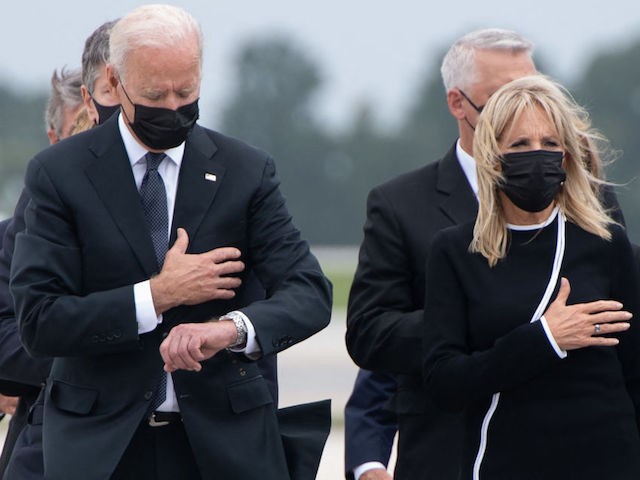
U.S. President Joe Biden looks down at Dover Air Force Base in Dover, Delaware, on August 29, 2021, during the dignified transfer of the remains of a fallen service member, one of the 13 members of the U.S. military killed in Afghanistan following the Taliban takeover. (SAUL LOEB/AFP via Getty Images)
That sounds foolish, given the Taliban’s fanaticism and tendency to exploit anything that looks like weakness. Two years after the debacle in Kabul, the Biden administration’s tough talk about using maximum pressure to either dislodge or reform the Islamic Emirate of Afghanistan is fading from memory.





Comments are closed.